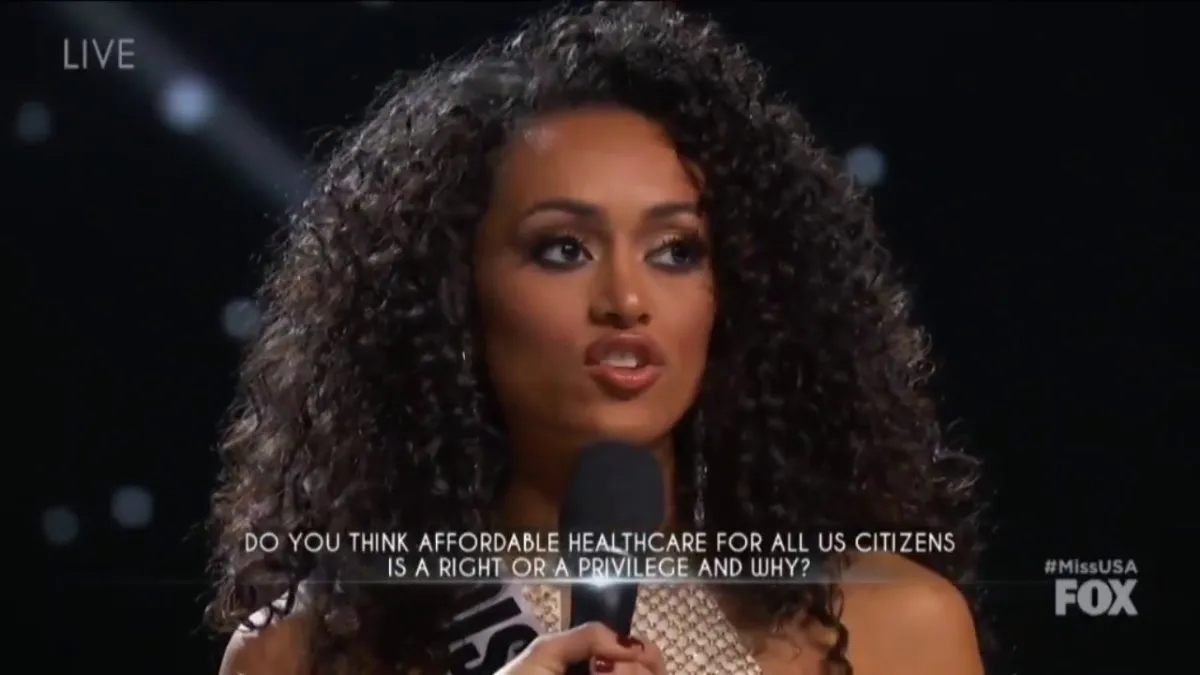Over the weekend, a new Miss USA was crowned, though the winner left a lot of viewers perplexed. Well, perplexed and/or really angry. We know that up until a just a couple of years ago, the Miss USA pageant was owned by Donald Trump, and therefore we expect it to have an obvious political bias and lowest common denominator appeal. Even still, some of Kára McCullough’s–then Miss D.C., now Miss USA’s– answers to the pageant questions were just too obtuse to believe.
First, when asked if she identifies as a feminist, she began her answer with the preface, “As a woman scientist in the government …” What a great start, right? NOPE! McCullough, who is a physical scientist at the Nuclear Regulatory Commission, continued that she like to “transpose the word ‘feminism’ to ‘equalism.'”
YEAH, HI, THAT’S EXACTLY WHAT FEMINISM MEANS. IT MEANS EQUAL. THAT’S LITERALLY ALL IT MEANS.
She wants us to know she’s not one of those “die hard” “I don’t really care about men” dot dot dot, something something.
Hi from #MissUSA, where Miss DC just announced she’s not a feminist, but an “equalist” who’s “not one of those die hards” 👀 pic.twitter.com/EIJoWhSAUI
— Maeve McDermott (@maeve_mcdermott) May 15, 2017
But that wasn’t her only questionable answer. When asked if she thought healthcare was a privilege or a right, she chose–you guessed it!–a privilege. Her actual response was, “I’m definitely going to say it’s a privilege. As a government employee, I’m granted health care and I see firsthand that for one to have health care, you need to have jobs.”
Here’s the thing, she just gave a really great lesson in what people mean when they talk about “having privilege.” When you view something as a luxury, simply because you have it, disregarding the struggles others face to get that thing, THAT’S PRIVILEGE. (For the sake of clarity, a privilege is different here than privilege. Think of a privilege as an advantage, and the concept of privilege as the taking for granted that comes along with not having to think about obtaining that advantage.)
Now, McCullough is attempting to “clarify” her answers in an interview with Cosmopolitan (and another nearly identical one with Good Morning America), saying it’s really hard to get out all your thoughts in 30 seconds, as if every contestant on that stage didn’t rehearse their answers to likely questions for months ahead of time. (And what is more likely these days than current political issues and “Are you a feminist?”)
About the health care issue, she told Cosmo, “[If] I have the opportunity just to clarify, I would definitely love to let people know that, yes I am privileged to have health insurance — it’s a privilege for me, and I’m thankful for that. But I also do believe health insurance is a right for everyone.”
Hey look, it’s that thing we were just defining.
On the issue of feminism, she says she’s “all about women’s rights.”
“Yes,” she continues, “I would have to say I am a feminist. But, when I look at the term “equalism,” [I used it] because I’ve seen firsthand in the workplace that we need those equal opportunities when it comes to leadership. And you know, the word [feminism] can carry different connotations [depending on what] generation you come from, or what background, but I don’t want anyone to think I’m not an active [supporter of] women’s rights.”
Yes, the word “feminism” does carry different connotations for different people. Mainly because people–including high-profile public figures like McCullough use their platform to perpetuate those completely false connotations: that being “die hard” about women’s rights is something to say in a mocking tone, or that you have to invent new words like “equalism” to define the exact thing feminism stands for.
McCullough points to the other women working at the Nuclear Regulatory commission, whom she looks up to and supports “100%.” She says, “They really embody what a hard-working woman is, someone who doesn’t take no for an answer, who’s very unapologetic about her leadership and her abilities.”
Does it feel like she’s actually thought here about what it means to be “unapologetic”? If unapologetic is a trait she looks up to in these women, why does she feel the need to make up a new word for one that already exists, one that erases connotations of gender from the issue of equality, so as not to risk alienating those who simply don’t understand the existing word? To be asked if you are a feminist and to answer that you “care about men” does nothing but promote the damaging and misguided notion that feminism is about men, and that we need men’s permission to feel comfortable calling ourselves feminists. I can’t think of anything more “apologetic” than to cater to this outdated fear of a misunderstood word.
(image: screengrab)
Want more stories like this? Become a subscriber and support the site!
—The Mary Sue has a strict comment policy that forbids, but is not limited to, personal insults toward anyone, hate speech, and trolling.—










Published: May 17, 2017 11:55 am